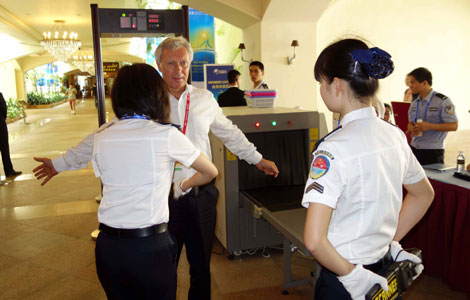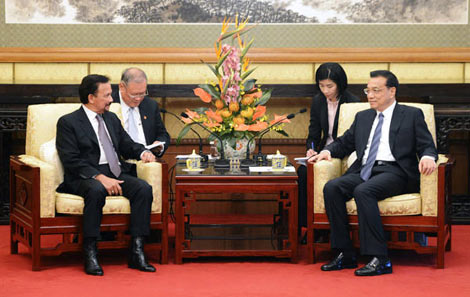
SYDNEY -- Australia's resource heavy economy is seeking to shift gears as its key source of FDI, China, begins to reassess its capital outflow, according to a series of major reports that reflect the critical role China is playing in the global restructuring of FDI.
According to an HSBC survey released Monday, Australia's stability and favorable business conditions attract Chinese investment, however a growing school of thought is calling for government and corporate intervention to ensure Australia's ongoing economic diversification and innovation.
The HSBC survey reveals a large proportion of Chinese companies are expanding offshore into the manufacturing and retail trade sectors rather than mining, Australia's core trading driver - as expected; and are prioritizing markets like Australia that have favorable business and political conditions.
Amongst 250 Chinese companies surveyed, 17 percent were large conglomerates with the remainder being of a corporate or middle market size.
Beyond Greater China (Hong Kong and Taiwan), 12 percent of respondents said they had set up an operation in Australia - the third highest behind the US (22 percent) and Singapore (18 percent).
James Hogan, head of Commercial Banking for HSBC Bank Australia, said, "As the world's 13th largest economy with only the 52nd largest population, increased capital inflow through direct foreign investment is necessary for Australia's continued prosperity."
"With Australia now China's seventh largest trading partner we are clearly front of mind for Chinese companies for exports and imports; however, it is important that we convert these trade links into investment links too."
The HSBC study shows 70 percent of Chinese companies choose to expand offshore to help with the flow of their foreign trade and 60 percent are seeking to expand their sales networks. Only one in three (32 percent) expand offshore to secure supply of raw materials.
The research comes as China's Commerce Ministry recently announced that China's outbound direct investment in the non- financial sector is expected to increase by 15 percent in 2013 to $77.22 billion.
For an economy strongly tethered to a China-led mining boom, the HSBC report is foreshadowing Australia's need to diversify, with the survey revealing more Chinese companies are investing offshore in manufacturing and wholesale/retail industries than mining.
According to Hogan, "By the time China's current five-year plan concludes in 2015, China's total direct outbound investments are expected to annually exceed $150 billion growing at expected 17 percent per annum."
"While 80 percent of China's investment into Australia to date has been in mining, its increasing demand for high-end manufacturing, renewable energy and agriculture will open up new opportunities for Australia."
But it was the joint report from KPMG and University of Sydney released last week that sent shockwaves through Australian official circles by forecasting the end of Australian dominance of Chinese capital investment.
The widely circulated report, jointly authored by teams led by respected cross-cultural leaders Professor Hans Hendrischke from the University of Sydney China Studies Centre and KPMG's Head of China Practice Doug Ferguson, found that competition for Chinese investment is tightening.
"The USA and Canada in particular are catching up with Australia. While Australia's accumulated Chinese direct investment is still ahead of its main international competitors, there is no denying that the rest of the world is hot on our heels and aggressively competing for Chinese capital." Professor Hendrischke said.
By the end of 2012, total accumulated investment reached $51 billion in Australia, followed by $50.7 billion in the United States and $36.7 billion in Canada. Other major recipients included Brazil and Russia. The largest investment destinations in Europe and Africa are the United Kingdom and Nigeria respectively.
The report says Australia needs to "create a commercial frameworks that help diversify cooperation between Australian and Chinese partners" if Australia's strategic significance is to be maintained.
Although short of the historic peak of $16.2 billion in 2008, Chinese direct investment inflows into Australia in 2012 increased 21 percent from 2011 to reach $11.4 billion, up from $9.4 billion in 2011 and $3.7 billion in 2010.
"These numbers confirm that Australia is still a priority destination due to our vast supply of high quality natural resources, stable and reliable institutional systems and clean, green and fresh image for lifestyle.
"While mining and resources still dominate investments, we're seeing greater diversification towards LNG, agribusiness, renewable wind energy and real estate," Ferguson told Xinhua.
Hogan predicted that Australia still has a lot to gain from laying further groundwork to attract Chinese investors.
"While Chinese investment in Australia has been small to date accounting for less than 3 percent of Australia's total foreign investment in 2011, it has ranked in the top three sources for proposed investments coming through for approval in the past three years. With the Chinese government now prioritizing outward investment over inward investment for the first time in 2012, China's role in Australia's foreign direct investment will inevitably rise in future." he said.
Australia's cultural anxiety over losing agricultural land to foreign investors was widely misplaced, according to Clayton Utz, countering the view that China was "buying the farm".
"FIRB (Foreign Investment Review Board) has formally intervened in respect of 9 percent of Chinese investments in energy and resources since 2005, and only three were rejected outright."
The onus is now on Australia to tackle the looming issues of productivity and corporate innovation to ensure there are reasons beyond white sands and blue oceans for China to come and play ' Down Under.'
 'Cat model' to dazzle Shanghai auto show 2013
'Cat model' to dazzle Shanghai auto show 2013
 Models at Tokyo modified car show
Models at Tokyo modified car show
 Shanghai Fashion Week focuses on domestic brands
Shanghai Fashion Week focuses on domestic brands
 Angel-dress models at Shandong auto show
Angel-dress models at Shandong auto show
 Safe and Sound
Safe and Sound
 Theater firms scramble for managers
Theater firms scramble for managers
 Premier pledges closer ties with Brunei
Premier pledges closer ties with Brunei
 Volkswagen's all-new GTI at New York auto show
Volkswagen's all-new GTI at New York auto show